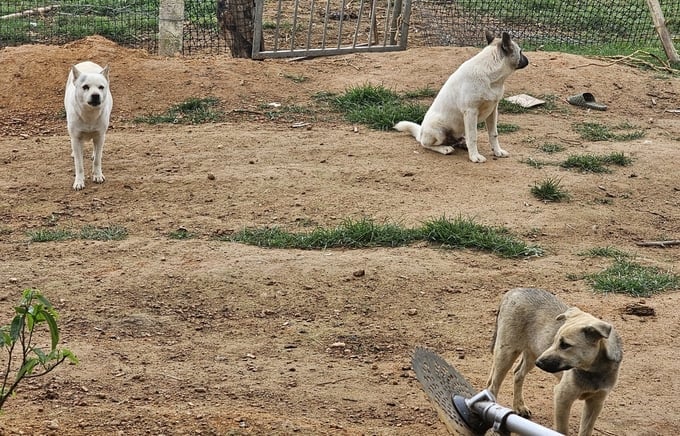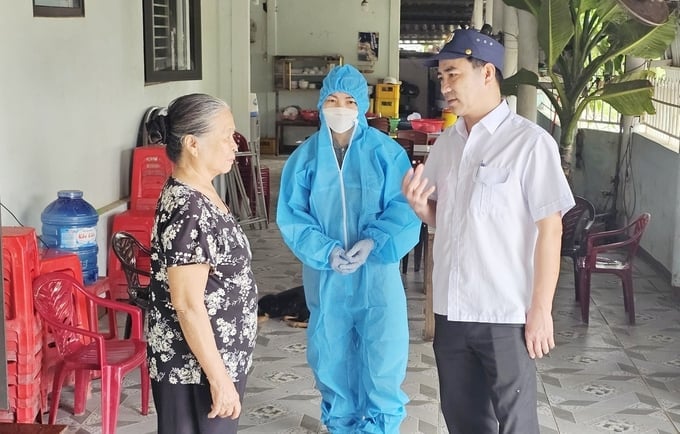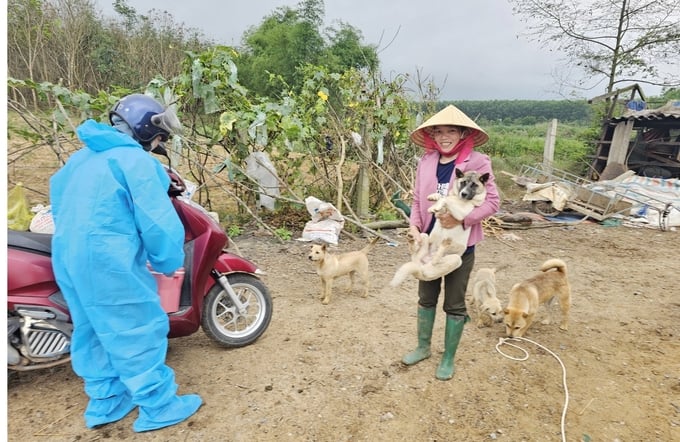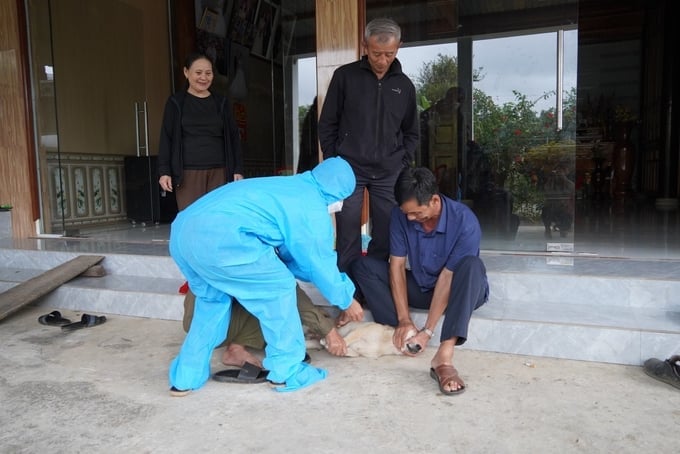May 21, 2025 | 09:00 GMT +7
May 21, 2025 | 09:00 GMT +7
Hotline: 0913.378.918
May 21, 2025 | 09:00 GMT +7
Hotline: 0913.378.918

Free-roaming dogs are a common sight in the rural areas of Quang Binh province. Photo: T. Phung.
In response to the increasingly complex outbreak of rabies across multiple provinces and cities nationwide, Quang Binh province's Sub-Department of Livestock Production and Animal Health directed local governments to actively organize rabies vaccination campaigns for dogs and cats in accordance with the Provincial People's Committee's plan.
Mr. Tran Cong Tam, General Director of the Quang Binh province's Sub-Department of Livestock Production and Animal Health, stated: "We have supported local residents in vaccinating their dogs and cats, in addition to promoting awareness and responsibility among pet owners to stabilize the local animal population and protect community health."
According to the Sub-Department, ther province houses over 71,000 dogs; however, the vaccination rate against rabies has only reached 42% of the total dog population. In response to the rapid spread of rabies, Quang Binh province aims to administer 60,000 doses of rabies vaccine to dogs by the end of 2024. Accordingly, several local governments within the province have been deploying the first round of vaccination since early March 2024.
Notably, no cases of animals contracting, or suspected of contracting rabies, have been reported in the province since the beginning of 2022. However, seven fatal cases of rabies in humans have been reported, with the primary cause being transmission from dog bites.
Quang Binh province has recorded 444 cases of local residents bitten by dogs or cats since the beginning of 2024. Subsequently, the residents received their first and second dose of rabies immunoglobulin at medical facilities managed by the Quang Binh CDC. Out of the animals involved, 108 were confirmed to have rabies, 148 escaped (cause of disappearance unknown), 4 showed signs of rabies, 2 were vaccinated, and the remaining showed no abnormal activities.
According to Mr. Tran Cong Tam, the province has documented one fatal case of rabies in human since the beginning of the year. Consequently, rabies vaccination programs must be deployed immediately. The Sub-Department has proposed local governments to promptly initiate and strengthen rabies vaccination efforts in compliance with the Provincial People's Committee's plan, which will require active cooperation from dog and cat owners.
Accordingly, pet owners must acknowledge that rabies vaccination is to protect themselves, their families, and the community. Moreover, local governments must assess the total population of dogs and provide clear warnings to residents regarding the risks and dangers of rabies.

Veterinary officers at all levels must actively disseminate information to the public regarding rabies and rabies prevention. Photo: T. Phung.
The number of people consuming dog meat and the number of eateries serving dog meat have significantly decreased within the last few years, leading to a gradual disappearance of dog theft and dog trapping. Consequently, it is common to see pet dogs roaming freely on village roads in rural areas.
Mr. Le Van So, a resident of Hong Thuy commune, Le Thuy district, owns two guard dogs. He shared that, in the past, the dogs were chained to prevent dog theft and trapping. He is now able to allow the dogs to roam freely without concern. When questioned about his dogs' vaccination against rabies, Mr. So casually responded, "There hasn't been any case of rabies among the neighborhood dogs in the last few years, so the locals don't consider vaccination necessary."
In response to local residents being bitten by dogs and succumbing to rabies after refusing vaccination, Mr. So commented, "I've heard about these cases on newspapers and on TV warnings. But people are not worried because no one in the area has been affected. At this rate, I might have to contact the veterinary officers to have my dogs vaccinated to be safe."
With the aim of preventing dogs from contracting rabies and biting local residents, Quang Binh province's Sub-Department of Livestock Production and Animal Health has cooperated with relevant agencies to train and disseminate rabies prevention measures to the public. However, the vaccination rate for rabid dogs in the province was relatively low in 2023.
"The main reason is that when veterinary officers visit dog-owning families come to vaccinate, the homeowners are either absent, or unable to restrain the dog for vaccination. Some homeowners see catching the dog for vaccination as the responsibility of the veterinary officers rather than their own," Mr. Tran Cong Tam explained.

The local residents have voluntarily restrained their dogs for rabies vaccination. Photo: T. Phung.
There are approximately 180 dogs in in Hoa Trach commune, Bo Trach district, Quang Binh province. Under the guidance of the district's Sub-Department Agriculture and Rural Development, local veterinary officers have actively carried out rabies vaccination for dogs and cats in the area.
Additionally, they recommend pet owners to use muzzles and leashes when when traveling with their dogs or cats in public. Pet owners are also requested to comply with regulations on rabies prevention and control.
For over a week, Ms. Nguyen Thi Le Thuy, a veterinary officer in Hoa Trach commune, has spent entire days visiting every household in each village to administer rabies vaccination for the local dog population. Based on the monitoring of local dog-owning households, veterinary officers have been traveling door-to-door to administer rabies vaccinations. Additionally, they regularly review and provide supplementary rabies vaccinations for new dog-owning households.
Rabies vaccination for dogs and cats has been widely implemented across all six villages in Hoa Trach commune since the beginning of the year under the local government's instructions. Additionally, rabies vaccination campaigns are organized twice per year, at the beginning and the end of the year, with every village focusing on vaccinating various livestock species, including rabies vaccination for dogs.
According to Mr. Duong Viet Truong, Vice Chairman of the Hoa Trach commune People's Committee, rabies vaccination has been administered to all local dog-owning households. "In order to effectively implement rabies prevention measures for dogs, the commune has conducted comprehensive and accurate annual surveys on dog-owning households, total dog populations, and cat populations. We have strengthened our information dissemination efforts by integrating information regarding the dangers, signs, and preventive measures for rabies in animals into meetings, conferences, and broadcast systems at the village level," Mr. Truong emphasized.
According to Mr. Truong, in addition to reinforcing its workforce at the commune and district level to support local communities in administering rabies vaccination, Trach Hoa mobilized civil servants, heads of community organizations, and representatives from each village to visit every household and awareness regarding vaccination, with the aim of eliminating animal-to-animal transmission.
"The commune also heavily penalizes dog and cat owners who fail to comply with rabies prevention regulations," Mr. Truong emphasized.
Similarly, veterinary officers in Dong Hoa commune, Tuyen Hoa district, are actively visiting every household to vaccinate dogs and cats against rabies. Mr. Nguyen Tien Nam, Chairman of the Dong Hoa Commune People's Committee, stated that there are currently 860 dogs and cats in the entire commune.
Rabies vaccination for animals have not received adequate attention from the local residents within the last few years. However, people's awareness regarding rabies vaccination has increased significantly following the fatal case of rabies in human. Notably, the commune achieved over 85% vaccination coverage for rabies prevention in dogs and cats in 2023.

Veterinary officers administer rabies vaccination for dogs in Dong Hoa commune. Photo: T. Phung.
"90% of the population has registered for vaccination in 2024, and at the moment, the commune is deploying its first round of vaccination for dogs, cats, and other livestock species," Mr. Nam said.
Mr. Tran Van Phuc, a resident in Dong Giang hamlet, Dong Hoa commune, reported: "People in the rural areas typically let their dogs roam freely. The risk of rabies outbreak is increased during hot weather conditions. Veterinary officers have also been disseminating information about rabies and preventive measures to the residents. As a result, regular rabies vaccination for dogs and cats is essential, and we fully comply whenever vaccination is scheduled."
According to Mr. Dinh Thanh Dung, Vice Chairman of the Tuyen Hoa District People's Committee, vaccines for Lumpy Skin Disease, Foot-and-mouth disease, and Pasteurellosis, are supported by the local government at 50% of the cost, whereas rabies vaccine for dogs and cats is fully supported. Notably, ethnic minority communities in Thanh Hoa and Lam Hoa communes receive full support for all of these vaccines.
"So far, Tuyen Hoa has administered over 5,500 doses of different vaccines according to the plan, achieving a vaccination rate of nearly 80%. The district provides full support for rabies vaccines for dogs and cats. Additionally, we are reinforcing the grassroots veterinary system to fulfill this task," Mr. Dinh Thanh Dung shared.
Translated by Nguyen Hai Long

(VAN) Facing the threat of rabies spreading to the community, Gia Lai province urgently carries out measures to vaccinate dogs and cats on a large scale.

(VAN) Disease-free livestock farming not only protects livestock herds but also stabilizes production and livelihoods for many farmers in Tuyen Quang.

(VAN) Japan's grant aid project contributes to capacity building, promoting organic agricultural production, and fostering sustainable community development in Dong Thap province.

(VAN) For years, the CRISPR-Cas9 genome technology has been reshaping genetic engineering, a precision tool to transform everything from agriculture to medicine.

(VAN) Vietnam aims to become a 'leader' in the region in the capacity and managing effectively soil health and crop nutrition.
![Reducing emissions from rice fields: [Part 1] Farming clean rice together](https://t.ex-cdn.com/nongnghiepmoitruong.vn/608w/files/news/2025/05/05/z6509661417740_a647202949c539012a959e841c03e1d3-nongnghiep-143611.jpg)
(VAN) Growing clean rice helps reduce environmental pollution while increasing income, allowing farmers to feel secure in production and remain committed to their fields for the long term.
/2025/05/19/5136-1-144800_230.jpg)
(VAN) The Nghe An Provincial People's Committee has just approved the list of beneficiaries eligible for revenue from the Emission Reductions Payment Agreement (ERPA) in the North Central region for the year 2025.